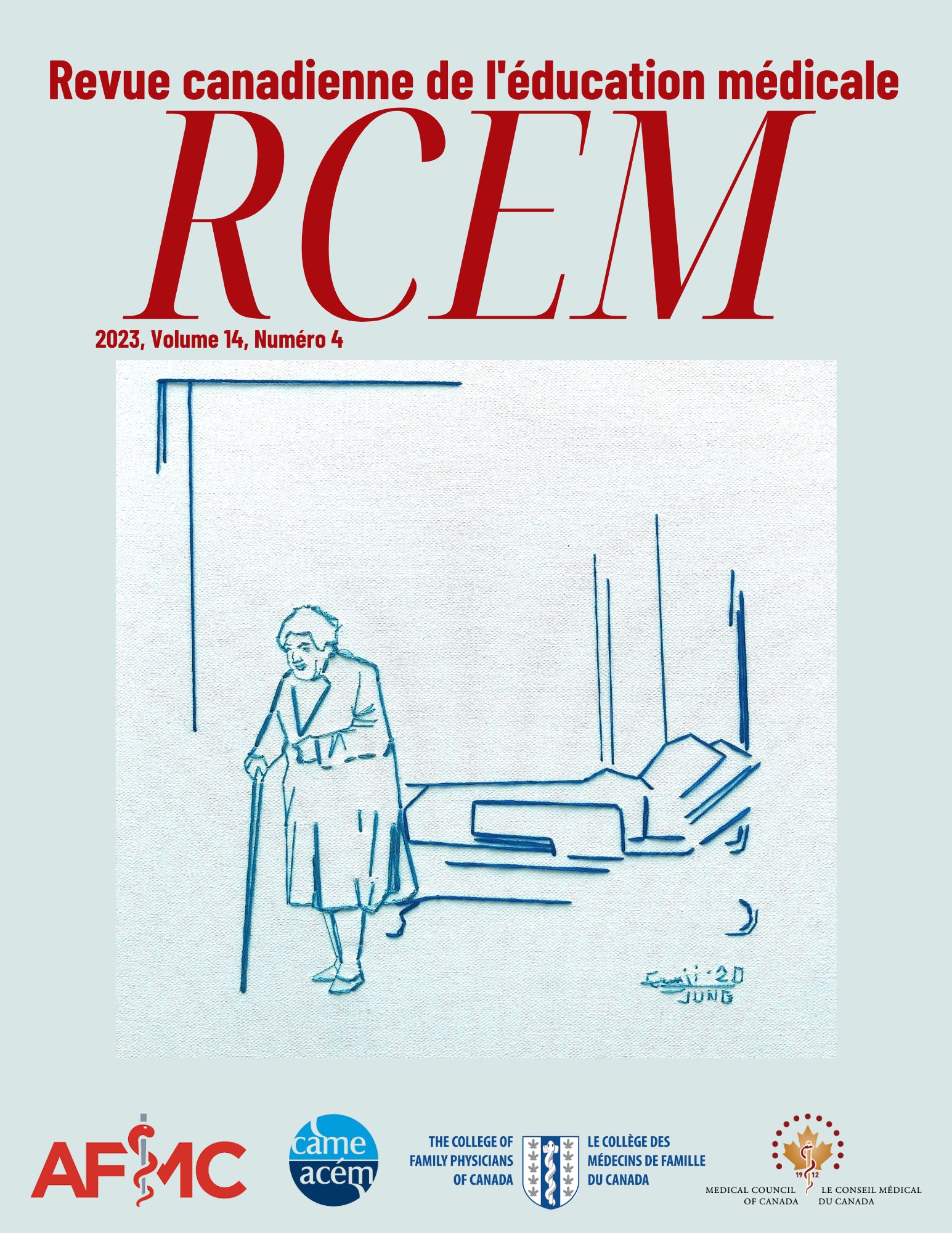Développement d'une échelle interdisciplinaire bilingue évaluant l'auto-efficacité à participer à l'aide médicale à mourir
DOI :
https://doi.org/10.36834/cmej.76161Résumé
L'aide médicale à mourir (AMM) est un processus complexe impliquant la personne qui demande le soin et ses proches. L'AMM implique des besoins physiques, psychosociaux et spirituels. Par conséquent, l'implication d'une équipe interdisciplinaire est bénéfique et la mise à niveau des connaissances et des compétences des professionnel.es est essentielle. Une équipe interdisciplinaire de l'Université Laval (Québec, Canada) a développé un programme de formation continue destiné aux professionnelles de la santé et des services sociaux susceptible d'être impliqué es dans ls soins et services des personnes qui demandent l’AMM et de leurs proches. Il est crucial d'évaluer si les objectifs du programme de formation continue sont atteints, d'autant plus que cette nouvelle formation aborde plusieurs questions complexes (juridiques, éthiques et cliniques). La théorie du sentiment d'auto efficacité de Bandura a été largement utilisée pour développer des échelles permettant d'évaluer l'impact des programmes de formation et d'identifier les lacunes en matière de connaissances. Cette théorie stipule que le fait de se sentir sûre de son efficacité personnelle conduit à une motivation intrinsèque à accomplir le comportement visé. Bien qu'il existe plusieurs échelles destinées à mesurer l'auto-efficacité dans le domaine des soins palliatifs, aucune n'inclut l'auto-efficacité pour la participation au processus entourant l’AMM. Par conséquent, nous développons une échelle interdisciplinaire bilingue (anglais-français) pour évaluer l'auto-efficacité à participer au processus entourant l’AMM. L'échelle permettra aux décideuses, décideurs et aux chercheuses et chercheurs d'identifier les lacunes actuelles en matière de connaissances. Elle sera également utile pour évaluer l'impact des programmes de formation actuels et futurs portant sur cette pratique de fin de vie. Dans cet article, nous présentons brièvement le programme de formation et les étapes futures du développement et de la validation de l'échelle.
Références
Brown, J. Goodridge D, Harrison A, Kemp J, Thorpe L, Weiler R. Care considerations in a patient- and family-centered medical Assistance in Dying program. J. Palliat. Care. 2022;37,341‑351 https://doi.org/10.1177/0825859720951661 DOI: https://doi.org/10.1177/0825859720951661
Hill JE, Stephani A-M, Sapple P, Clegg AJ. The effectiveness of continuous quality improvement for developing professional practice and improving health care outcomes: a systematic review. Implement. Sci. 2020;15,23 https://doi.org/10.1186/s13012-020-0975-2 DOI: https://doi.org/10.1186/s13012-020-0975-2
Dehghani F, Barkhordari-Sharifabad M, Sedaghati-Kasbakhi M, Fallahzadeh H. Effect of palliative care training on perceived self-efficacy of the nurses. BMC Palliat. Care 2020;19,63. https://doi.org/10.1186/s12904-020-00567-4 DOI: https://doi.org/10.1186/s12904-020-00567-4
Liu L, Zhao Y-Y, Zhang L-H, Chan HY-L. Measuring self-efficacy and readiness for advance care planning in Chinese older adults. J. Pain Symptom Manage. 2020;60,622‑629. https://doi.org/10.1016/j.jpainsymman.2020.06.013 DOI: https://doi.org/10.1016/j.jpainsymman.2020.06.013
Bandura. Self-efficacy: the exercice of control. 1997; W. H. Freeman.
Phillips J, Salamonson Y, Davidson PM. An instrument to assess nurses' and care assistants' self-efficacy to provide a palliative approach to older people in residential aged care: a validation study. Int. J. Nurs. Stud. 2011;48, 1096‑1100. https://doi.org/10.1016/j.ijnurstu.2011.02.015 DOI: https://doi.org/10.1016/j.ijnurstu.2011.02.015
Desbiens J-F, Fillion L. Development of the palliative care nursing self-competence scale. J. Hosp. Palliat. Nurs. 2011;13, 230‑241. https://doi.org/10.1097/NJH.0b013e318213d300 DOI: https://doi.org/10.1097/NJH.0b013e318213d300
Terwee CB, Prinse CAC, Chiarotto A, et al. COSMIN methodology for evaluating the content validity of patient-reported outcome measures: a Delphi study. Qual. Life Res. 2018;27,1159‑1170. https://doi.org/10.1007/s11136-018-1829-0 DOI: https://doi.org/10.1007/s11136-018-1829-0
Boateng GO, Neilands TB, Frongillo EA, Melgar-Quiñonez HR, Young SL. Best practices for developing and validating scales for health, social, and behavioral research: a primer. Front. Public Health 2018;6,149. https://doi.org/10.3389/fpubh.2018.00149 DOI: https://doi.org/10.3389/fpubh.2018.00149
Collège des médecins du Québec et al. Guide d'exercice et lignes directrices pharmacologiques. 2019;226. https://numerique.banq.qc.ca/patrimoine/details/52327/3438
LeBlanc S, MacDonald S, Martin M, Dalgarno N, Schultz K. Development of learning objectives for a medical assistance in dying curriculum for Family Medicine Residency. BMC Med. Educ. 2022;22,167. https://doi.org/10.1186/s12909-022-03204-1 DOI: https://doi.org/10.1186/s12909-022-03204-1
Zamanzadeh V, Ghahramanian A, Rassouli M, Abbaszadeh A, Alavi-Majd H, Nikanfar A-R. Design and implementation content validity study: development of an instrument for measuring patient-centered communication. J. Caring Sci. 2015;4,165‑178 https://doi.org/10.15171/jcs.2015.017 DOI: https://doi.org/10.15171/jcs.2015.017
Polit DF, Beck CT, Owen SV. Is the CVI an acceptable indicator of content validity? Appraisal and recommendations. Res. Nurs. Health 30, 459‑467 (2007). https://doi.org/10.1002/nur.20199 DOI: https://doi.org/10.1002/nur.20199
Koller M, Aaronson NK, Blazeby J, et al. Translation procedures for standardised quality of life questionnaires: the European Organisation for Research and Treatment of Cancer (EORTC) approach. Eur. J. Cancer. 2007;43, 1810‑1820. https://doi.org/10.1016/j.ejca.2007.05.029 DOI: https://doi.org/10.1016/j.ejca.2007.05.029
Brislin RW. Back-translation for cross-cultural research. J. Cross. Cult. Psychol. 1, 1970;185‑216. https://doi.org/10.1177/135910457000100301 DOI: https://doi.org/10.1177/135910457000100301
Bertrand R, Blais J-GR, Bertrand J-G. Modèles de mesure : l'apport de la théorie des réponses aux items. 2004;376, 37‑69.
Polit DF, Beck CT. Nursing research: generating and assessing evidence for nursing practice. 2021. Wolters Kluwer.
Devellis RF, Thorpe CT. Scale development. 2021. Sage Publications.
Téléchargements
Publié
Numéro
Rubrique
Licence
© Diane Tapp, Ariane Plaisance, Nathalie Boudreault, Isabelle St-Pierre, Jean-Francois Desbiens, Sarah-Caroline Poitras, Elizabeth Lemay, Luis Alejandro Urrea, Amélie Lapointe, Melissa Henry, Gina Bravo 2023

Cette œuvre est sous licence Creative Commons Attribution - Pas d'Utilisation Commerciale - Pas de Modification 4.0 International.
La soumission d’un manuscrit original à la revue constitue une indication qu’il s’agit d’un travail original, qu’il n’a jamais été publié et qu’il n’est pas envisagé pour publication dans une autre revue. S’il est accepté, il sera publié en ligne et ne pourra l’être ailleurs sous la même forme, à des fins commerciales, dans quelque langue que ce soit, sans l’accord de l’éditeur.
La publication d’une recherche scientifique a pour but la diffusion de connaissances et, sous un régime sans but lucratif, ne profite financièrement ni à l’éditeur ni à l’auteur.
Les auteurs qui publient dans la Revue canadienne d’éducation médicale acceptent de publier leurs articles sous la licence Creative Commons Paternité - Pas d’utilisation commerciale, Pas de modification 4.0 Canada. Cette licence permet à quiconque de télécharger et de partager l’article à des fins non commerciales, à condition d’en attribuer le crédit aux auteurs. Pour plus de détails sur les droits que les auteurs accordent aux utilisateurs de leur travail, veuillez consulter le résumé de la licence et la licence complète.











